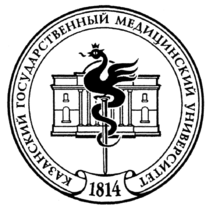Kazan State Medical University
| Kazan State Medical University, Kazan | |
|---|---|
 | |
| Motto | Omnium profecto artium medicina nobilissima (Latin) |
| Established | 1814 |
| Type | Public |
| Chancellor | Prof. Aleksey Sozinov |
Administrative staff | 1,400 (700 academic staff) |
| Students | 4,000 |
| Location | Kazan, Russia |
| Campus | urban |
| Nickname | KSMU |
| Website | http://www.kgmu.kcn.ru; http://www.kazansmu.com |
Coordinates: 55°47′26.26″N 49°8′27.23″E / 55.7906278°N 49.1408972°E
Based primarily in Kazan, Tatarstan, Russia, the Kazan State Medical University (KSMU) is a federal university made up of nine faculties.
Kazan State Medical University is a multifunctional and multi-levelled state institution of higher learning in medicine. It meets both personal and social needs in acquiring education in medicine, in developing biomedical and clinical sciences, as well as broadening scientific knowledge of medical sciences. Kazan State Medical University (KSMU) functions on the basis of self-governance and belongs to the system of Higher Education and Scientific Research of the Ministry of Health of Russia. The highest body or KSMU self governance is academic council with university’s regulations. On March 6, 1994, the university was issued with a license number 16 G – 235 by the State Committee of Russian Federation of Higher Education which grants the right to perform activities in the field of professional education. Under the auspices of Kazan State Medical University there work a pharmaceutical and two medical colleges in Kazan, one medical college Mary EI Republic, lycee and biomedical classes on the secondary school basis. This complex educational system in the frame work of the university provides the continuous higher education of medicine. Kazan State Medical University carries on an aimed preparation of experts in different fields of medicine for 10 republics, Povolzhie and Ural regions. According to the results of a rating of medical schools, KSMU takes the 16 place among 86 other universities. (The Gourman Report A rating of graduate and Professional programs in American and International Universities, Fifth Edition. Revised Dr. Jack Gourman Nation Educational Standards. 1989) Founded in 1814, KSMU was the second university institution to be founded in Kazan, the third medical university institution in the Russia.
Rankings & Reputation
According to the prestigious Academic Ranking of World Universities-European Standard ARES-2014, published by European Scientific-Industrial Chamber, KSMU has secured the third place among the Medical Universitites in Russia. KSMU is ranked 3964 by the Webometrics world ranking and ranked 7354 in the 4icu world university ranking.
Geography and location
Kazan State Medical University (KSMU) is located in central part of Kazan. The KSMU main campus is on Butlerov Street, although there are also other KSMU buildings throughout Kazan. The main campus includes main libraries, the museum, the departments of foreign languages, history, philosophy, political science and sociology, medical biology and genetics, public health and organization of healthcare, economical theory and social work, general and organic chemistry, microbiology, pathological physiology. A further set of buildings based around Universitetskaya Street includes the departments of physiology, histology and anatomy.
The area around KSMU is occupied by a number of other renowned institutions, including Lobachevsky Library, Kazan State Technical University, Tatar State University of Humanities and Education, Kazan State University
The nearest bus stop to the main KSMU campus is Tolstogo. Other nearby bus stops are CPKOiO im Gorkogo, Shmidta, Chekhovsky rinok, Mushtari, Dostoevskogo.
Teaching System
The curriculum for General Medicine (M.D equivalent to M.B.B.S), Dentistry and Pharmacy are righteously extensive and updated. Each subject begins with studying of the disease & emphasis is laid on epidemiology, aetiology, pathogenesis, pathological physiology, pathological morphology, clinical picture, methods of laboratory and instrumental examination of a patient, diagnoses, differential diagnoses, complication, prognosis, treatment and prevention. Latin terms are given according to the International Nomenclature of different specialties. During the period of training students are taught special subjects: in succession they learn theoretical (from 1st to 3rd year) and clinical fundamentals (from 4th to 6th year) and acquire necessary practical skills. Every stage of training builds a foundation to climb up to the next level. The teaching process includes approach, beginning with lectures proceeded by laboratory and practical work at hospitals along with in depth examination of patients, clinical duties etc. Along with meticulous teaching equal emphasis is laid on colloquial, tests, quizzes, examinations, state examinations, final Interdisciplinary test, oral answers, laboratory and written works, MCQ-tests, recording of case histories also form the part of day to day activity.
Marking system
Every subject after assessing and evaluating the student’s performance is allocated a grade as below: Grade - “5”, five signifies excellent performance. Grade - “4”, four signifies Good performance. Grade - “3”, three signifies satisfactory performance. However, it is understood that: Grade 5 is equivalent to – 90% and above; Grade 4 is equivalent to – 80-89%; Grade 3 is equivalent to - 75 -79%; Grade 2 stands for failure.
History
- In 1804 Emperor Alexander I gives out his royal command to open a University in Kazan.
- In 1814 opens the faculty of Medicine in Kazan Emperor University
- In 1837 Anatomical theater, the unique monument of the Russian classicism of 19th century, is built according to the appearance of Italian Anatomic theaters of Renaissance by M.P.Korinfskiyi with participation of Nikolai Lobachevsky - rector of the Kazan Emperor's University.
- In 1840 University clinic opens.
- In 1930 Medical Faculty of Kazan State University reorganizes into Kazan Medical Institute.
- On April 29, 1994 Kazan Medical Institute acquires the status of the Kazan State Medical University.
Student accommodation
Many KSMU students are accommodated in the college's own halls of residence.KSMU has four hostels for its students accommodation.